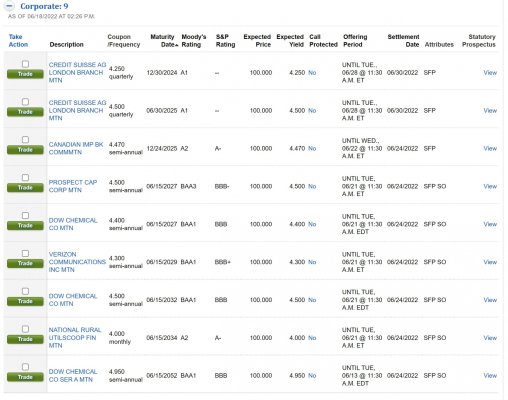Freedom56
Thinks s/he gets paid by the post
Earlier in the year, I stated that 2022 was going to be one of the best periods to create or add to a bond ladder. We are almost half way through the year and yields are moving up nicely and we are entering a period where savers can once again generate income without taking too much risk. The coupons for new CDs, treasuries, and high grade corporate notes are being issued at rates that we have not seen for over five years. In the secondary markets for short term corporate bonds/notes yields are increasing to levels not seen since March 2020 as bonds funds face redemptions. This trend will continue through the year until the Fed changes course. The distribution yields from bond funds are far too low relative to safer investments where there is no risk to capital, forcing passive bond funds into a "buy high" and "sell low" mode. This will continue until money starts flowing back into bond funds. This is unlikely to happen when even CDs and treasuries are yielding more than many bond funds.
At this phase of rate hikes buy the highest coupon and shortest duration fixed income instruments. Don't go beyond five years at this point.
If you want to take zero risk buy CDs and treasuries and high grade corporate notes (A rated) when they are issued and always compare the yields. Keep in mind when you buy these types of instruments, you are paid the coupon and you capital is returned at maturity. Corporate notes from major banks in North America are the safest.
If you want better yields than what brokerage firms are offering, buy CDs, treasuries, and corporate notes on the secondary market using limit orders. Remember you have the upper hand in a rate hike cycle. For newly issued corporate notes, brokerage firms typically take 2% commission that is reflected in the coupon you are receiving. So many investors wait for new issues to hid the secondary market, when demand is weak or muted, and attempt to buy issues below par value. Brokerage firms normally don't want to hold inventory and will dump issues below par sacrificing some of their commission. The same is true for CDs. This is why you sometimes see your corporate note or CD drop below the price you paid. However at maturity your capital is returned at par. Your yield is fixed at the time you buy the CD, treasury, or corporate note and your capital is returned at maturity.
Here are some new corporate issues coming to market this week (see attached image). Of the nine issues, only the first three (Credit Suisse 4.25%, Credit Suisse 4.5%, CIBC 4.47%) are worth buying. The 42 month note from CIBC is the safest followed by the two notes from Credit Suisse.
Avoid the issue from Prospect Capital completely. This one will crash and burn in the secondary market. Shorter duration notes from this company are already trading at yields over 7% in the secondary market.
The coupons on the Dow Chemical offerings are too low and you are likely to see the prices fall and yields move up when they hit the secondary market.
The coupons on the Verizon and National Rural issues are too low and the durations are too long. These issues will fall well below par in the secondary market in this environment. So avoid these new issues at this time.
At this phase of rate hikes buy the highest coupon and shortest duration fixed income instruments. Don't go beyond five years at this point.
If you want to take zero risk buy CDs and treasuries and high grade corporate notes (A rated) when they are issued and always compare the yields. Keep in mind when you buy these types of instruments, you are paid the coupon and you capital is returned at maturity. Corporate notes from major banks in North America are the safest.
If you want better yields than what brokerage firms are offering, buy CDs, treasuries, and corporate notes on the secondary market using limit orders. Remember you have the upper hand in a rate hike cycle. For newly issued corporate notes, brokerage firms typically take 2% commission that is reflected in the coupon you are receiving. So many investors wait for new issues to hid the secondary market, when demand is weak or muted, and attempt to buy issues below par value. Brokerage firms normally don't want to hold inventory and will dump issues below par sacrificing some of their commission. The same is true for CDs. This is why you sometimes see your corporate note or CD drop below the price you paid. However at maturity your capital is returned at par. Your yield is fixed at the time you buy the CD, treasury, or corporate note and your capital is returned at maturity.
Here are some new corporate issues coming to market this week (see attached image). Of the nine issues, only the first three (Credit Suisse 4.25%, Credit Suisse 4.5%, CIBC 4.47%) are worth buying. The 42 month note from CIBC is the safest followed by the two notes from Credit Suisse.
Avoid the issue from Prospect Capital completely. This one will crash and burn in the secondary market. Shorter duration notes from this company are already trading at yields over 7% in the secondary market.
The coupons on the Dow Chemical offerings are too low and you are likely to see the prices fall and yields move up when they hit the secondary market.
The coupons on the Verizon and National Rural issues are too low and the durations are too long. These issues will fall well below par in the secondary market in this environment. So avoid these new issues at this time.
Attachments
Last edited:

